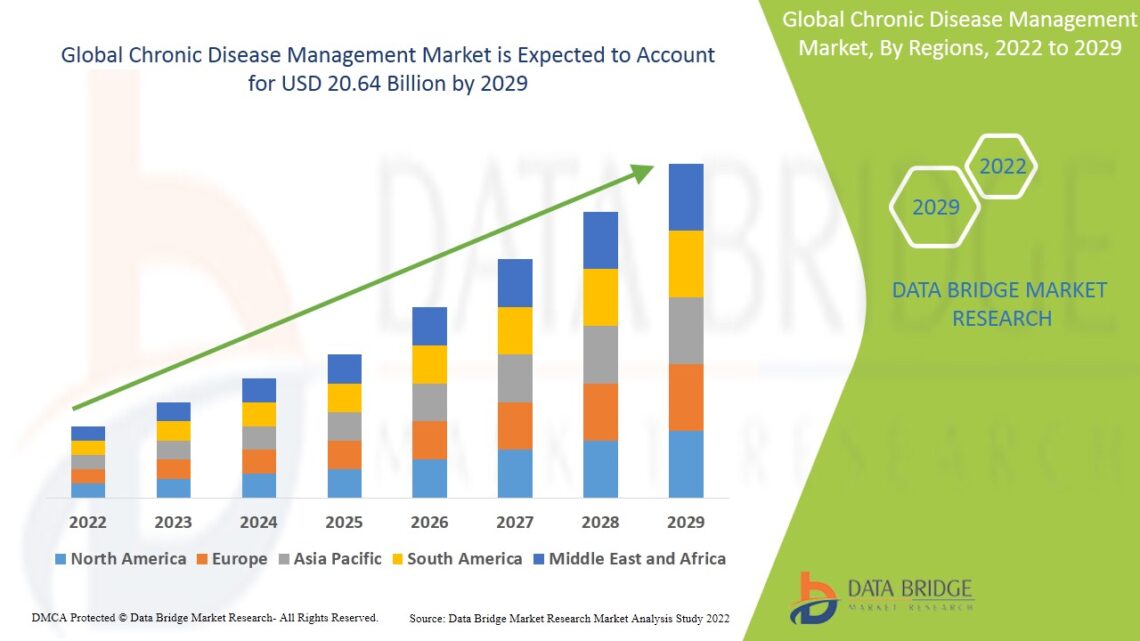
The Growing Importance of Chronic Disease Management Market
Introduction
Globally, chronic diseases pose a significant threat to human health and well-being, being the leading cause of mortality and disability. According to the World Health Organization’s global status report on non-communicable diseases in 2010, chronic diseases are responsible for approximately 60% of deaths and contribute to 43% of the global disease burden. Chronic diseases refer to long-term progressive ailments that often require ongoing management and treatment.
The impact of chronic diseases is not limited to the loss of life but also extends to the immense economic burden they place on healthcare systems worldwide. These diseases are among the most expensive and common healthcare challenges faced by nations across the globe. The management of chronic diseases has become a crucial aspect of healthcare, aiming to provide effective care and support to individuals living with these conditions.
What does chronic disease management mean?
Chronic disease management refers to the strategies, interventions, and healthcare services aimed at providing comprehensive care and support to individuals living with chronic conditions. Chronic diseases are long-term illnesses that often require ongoing management, as they cannot be cured completely but can be controlled and their impact minimized.
Chronic disease management involves a multi-faceted approach that addresses various aspects of the individual’s health and well-being. It focuses on not only treating the symptoms of the disease but also empowering the patient to actively participate in their own care and make informed decisions about their health.
Key components of chronic disease management may include:
- Education and information: Providing patients with knowledge about their condition, its causes, symptoms, and treatment options. This empowers individuals to better understand their disease and make informed choices about their lifestyle, medication adherence, and self-care practices.
- Treatment planning: Collaborating with healthcare providers to develop personalized treatment plans tailored to the specific needs of the individual. This may involve a combination of medications, therapies, lifestyle modifications, and preventive measures.
- Regular monitoring: Utilizing tools such as regular check-ups, diagnostic tests, and remote monitoring devices to track the progress of the disease and identify any changes or complications. This helps in adjusting the treatment plan and addressing emerging issues promptly.
- Lifestyle modifications: Encouraging individuals to adopt healthy habits, such as maintaining a balanced diet, engaging in regular physical activity, managing stress, and avoiding tobacco and excessive alcohol consumption. These lifestyle modifications can have a significant impact on disease progression and overall well-being.
- Self-management support: Equipping patients with self-care skills and tools to manage their condition on a day-to-day basis. This may include teaching individuals how to monitor their symptoms, adhere to medication schedules, recognize warning signs, and seek appropriate care when needed.
- Coordination of care: Ensuring effective communication and coordination among healthcare providers, specialists, and other support services involved in the patient’s care. This helps in providing integrated and continuous care, preventing fragmented and disjointed healthcare experiences.
- The goal of chronic disease management is to optimize the individual’s quality of life, minimize disease progression and complications, and reduce the burden on healthcare systems. It recognizes that chronic diseases require a long-term, proactive approach that empowers patients to actively engage in their own care and make positive choices for their health.
Expansion rate in chronic disease management market
According to the analysis conducted by Data Bridge Market Research, the chronic disease management market had a value of USD 6.17 billion in 2021. However, the market is projected to experience significant growth in the coming years, with an expected value of USD 20.64 billion by 2029. This represents a compound annual growth rate (CAGR) of 16.3% during the forecast period from 2022 to 2029.
The market report prepared by the Data Bridge Market Research team offers a comprehensive and detailed analysis of the chronic disease management market. It incorporates in-depth expert analysis, patient epidemiology, pipeline analysis, pricing analysis, and regulatory framework. This comprehensive approach provides valuable insights into the market dynamics, trends, and factors driving its growth.
The expert analysis included in the report involves a thorough examination of various aspects of the chronic disease management market, such as market size, competitive landscape, emerging technologies, and key market players. This analysis helps stakeholders, including healthcare providers, manufacturers, investors, and policymakers, to make informed decisions and develop effective strategies.
Importance of Chronic Disease Management Market
- The chronic disease management market is experiencing a growing importance and demand due to several factors. Here are some key reasons behind the increasing significance of the chronic disease management market:
- Rising Prevalence of Chronic Diseases: The prevalence of chronic diseases, such as cardiovascular diseases, diabetes, cancer, respiratory disorders, and mental health conditions, is on the rise globally. This growing burden of chronic illnesses necessitates effective management strategies and healthcare services to address the needs of the increasing number of individuals living with these conditions.
- Aging Population: The world’s population is aging rapidly, leading to a higher incidence of chronic diseases. Older adults are more susceptible to chronic conditions, and their management becomes a critical aspect of healthcare delivery. Chronic disease management plays a crucial role in promoting healthy aging, preventing complications, and improving the quality of life for older individuals.
- Shift towards Patient-Centric Care: There is a paradigm shift in healthcare towards patient-centric care models, where patients are actively involved in their own health management. Chronic disease management empowers patients to take charge of their health through education, self-monitoring, and self-management tools. This approach fosters better patient engagement, improved outcomes, and reduced healthcare costs.
- Technological Advancements: Rapid advancements in digital health technologies, telemedicine, wearable devices, and remote monitoring systems have revolutionized chronic disease management. These technological solutions enable healthcare providers to remotely monitor patients, collect real-time health data, and deliver personalized care interventions. The integration of technology in chronic disease management has the potential to enhance accessibility, convenience, and efficiency of healthcare services.
- Cost-Effectiveness and Healthcare Savings: Chronic diseases are associated with substantial healthcare costs, including hospitalizations, medications, and long-term care. Effective chronic disease management programs can help reduce hospital readmissions, emergency department visits, and disease-related complications. By preventing or managing these costly events, chronic disease management contributes to healthcare savings and improved resource allocation.
- Government Initiatives and Policies: Governments worldwide are recognizing the impact of chronic diseases on public health and healthcare systems. They are implementing policies and initiatives that prioritize chronic disease prevention and management. These include promoting population health, supporting chronic disease management programs, and incentivizing healthcare providers to deliver comprehensive care for chronic conditions.
In order to learn more about chronic disease management market visit
https://www.databridgemarketresearch.com/reports/global-chronic-disease-management-market
About data bridge market research
The market report prepared by the Data Bridge Market Research team offers a comprehensive and detailed analysis of the chronic disease management market. It incorporates in-depth expert analysis, patient epidemiology, pipeline analysis, pricing analysis, and regulatory framework. This comprehensive approach provides valuable insights into the market dynamics, trends, and factors driving its growth.
The expert analysis included in the report involves a thorough examination of various aspects of the chronic disease management market, such as market size, competitive landscape, emerging technologies, and key market players. This analysis helps stakeholders, including healthcare providers, manufacturers, investors, and policymakers, to make informed decisions and develop effective strategies.
Patient epidemiology is another crucial component of the market report, focusing on the prevalence, incidence, and demographics of chronic diseases. This epidemiological data provides a deeper understanding of the target patient population and aids in tailoring chronic disease management approaches to meet their specific needs.
Additionally, the report incorporates pipeline analysis, which evaluates the ongoing research and development activities related to chronic disease management. This analysis highlights potential future treatments, technologies, and interventions that may impact the market. Furthermore, pricing analysis is included to assess the pricing trends and dynamics within the chronic disease management market. This analysis helps stakeholders understand the pricing strategies adopted by market players and their implications for market growth and profitability.



